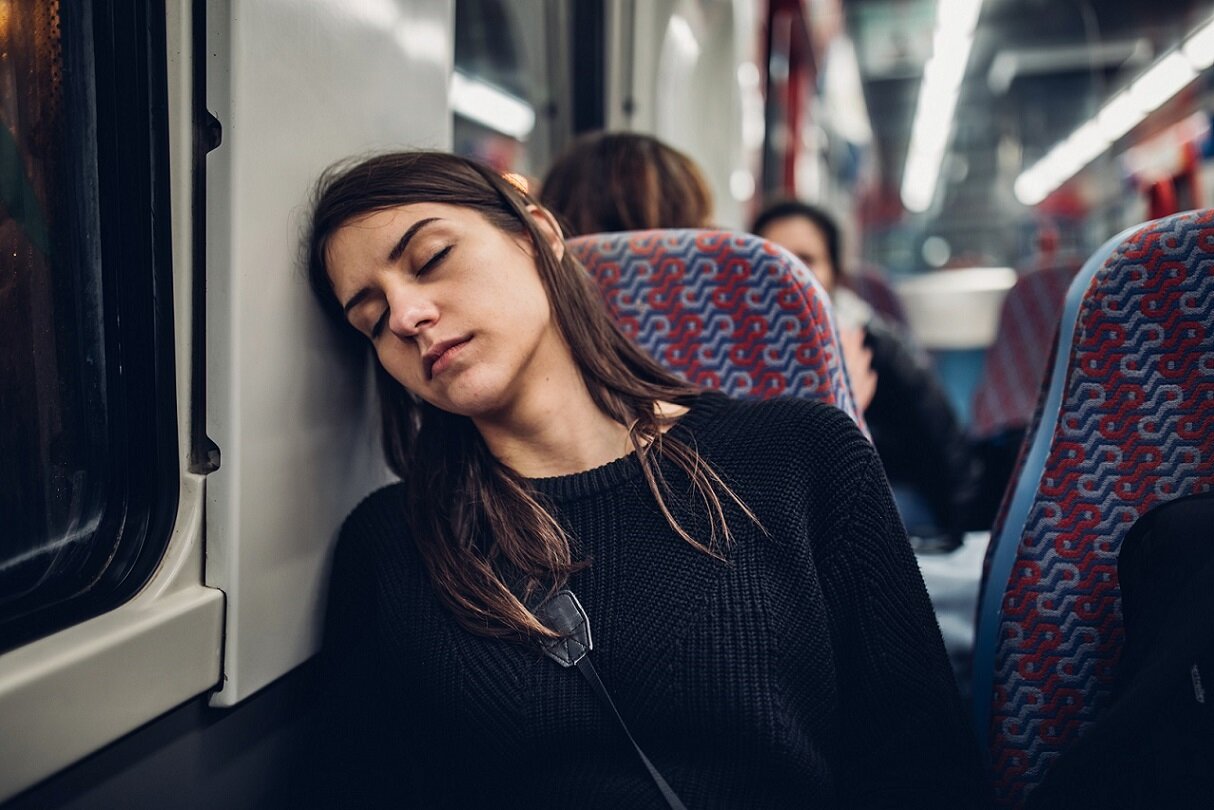Sleep is often regarded as the foundation of good health, yet in our fast-paced and digitally connected world, it’s easy to overlook just how vital a good night’s rest truly is. Beyond simply recharging our bodies, sleep plays a crucial role in restoring our mental resources and maintaining emotional balance. But what actually happens in our brains while we sleep, and why do so many people struggle to get the rest they need?
In this article, we explore the science of sleep, the common problems that can disrupt it, and practical strategies for improving your nightly rest—so you can wake up refreshed and ready for whatever the day brings.
Sleep deprivation influences our cognitive abilities during the day - Image Credit: eldar nurkovic via Shutterstock / HDR tune by Universal-Sci
After a full day of demanding tasks, a good night of sleep is crucial for the recovery of our body, but also of great importance for replenishing the resources of our mind. At night our brains undergo a full 'wash-out,' clearing out brain-waste and toxins accumulated during the day. The exact underlying mechanisms remain unclear; however, it is of no surprise that, when under a lack of sleep, our brains cannot function as well as after a good night's rest.
Sleep deprivation influences our cognitive abilities during the day. It can result in problems with sustained attention, impulse regulation, reasoning, processing speed and makes it more challenging to memorize information correctly. Also, we are more prone to emotional imbalance, and in the long-term: psychological disorders such as depression and anxiety. It is reasonable to conclude that getting a good night's sleep is essential for our well-being and maintaining our body and mind in optimal shape.
Multiple problems that can disrupt our sleep
The American National Sleep Foundation recommends 7 to 9 hours of sleep for adults between 26 and 64 years old. Studies show that, for the elderly of 65 and above, 7 to 8 hours should be sufficient. However, getting a good night of sleep is not that obvious for everyone. If you are experiencing sleep problems, you are not alone. We tend to call ourselves "sleep-deprived" when experiencing sleep-related problems. However, theoretically, this might be incorrect; multiple issues can disrupt your sleeping patterns. Let's take a brief look at four of the most common forms.
Sleep-deprivation
Sleep disturbances can result from a shortened period of sleep, problems in timing (falling asleep during the day, not being able to sleep at night), or insufficient quality of sleep. Disturbances like these often occur voluntarily but can also be the consequence of a genetic predisposition or enforced upon you by your social or physical environment. When someone is intrinsically able to sleep, but circumstances result in a (voluntarily) insufficient period of sleep, this person can be defined as 'sleep-deprived.'
Psychological disorders such as depression, obsessive-compulsive disorder, and schizophrenia are also associated with sleep problems. A bidirectional relationship between chronic sleep deprivation and health problems is observed in the general population (Itani et al., 2017). However, it remains unclear if these problems result from a lack of sleep or low quality of sleep (Bao et al., 2017).
Sleep-wake disorder
Problems in timing (sleep-wake issues) are often observed in individuals that deviate in their circadian rhythms from the average population (Crowley and Eastman, 2018).
One out of five people of the general population meets the clinical diagnostic criteria for a sleep-wake disorder (Luik et al., 2019). Some internal clocks put naturally more hours in a 24-hour day. These clocks are a bit slower, and people, therefore, prefer sleeping later. We know them as "night owls." Those with a 'quick clock' feel like going to bed and waking up earlier and often mentioned "morning people."
Night owl burning the midnight oil - Image Credit: Lemberg Vector studio via Shutterstock / HDR tune by Universal-Sci
Insomnia
Different from sleep-deprivation and timing problems is insomnia. In the case of insomnia, a person does get enough sleeping time, but the objective and subjective quality of sleep is not sufficient. The sleep is fragmented and interrupted with short periods of wakefulness. This has been described as 'the brain seems to not be able to fully surrender to sleeping' and keeps being alert to make sure everything is alright. This state-of-mind is known as hyperarousal and is present during the night and day.
Someone with insomnia deviates from a healthy sleeper in that when sleep-deprived, the healthy sleeper will be drowsy, not hyperactive. People with insomnia will usually still be able to cognitively and physically perform during the day (Luik et al.). Insomnia is quite common; one in three people suffer from it at some point in their lives. The prevalence is particularly high in the elderly and people with a neurological or psychiatric disease.
Narcolepsy and lethargy
In contrast with sleep-deprivation, research shows that chronic patterns of too much sleep also seem to be associated with health problems. This sleep disorder called 'narcolepsy' is characterized by overwhelming day drowsiness and sudden attacks of sleep.
In addition to narcolepsy, depression can also result in too much sleep. One of its symptoms is lethargy, often described as tiredness, weariness, fatigue, or lack of energy. It not too much of a surprise that this issue often leads to oversleeping.
Treatment
Sleep problems are usually seen secondarily to other comorbid disorders or diseases; however, treating these comorbidities rarely leads to better sleep (Luik et al. 2019). Generally, in all different cases of sleep problems, people will initially be advised on their sleep-hygiene.
Sleep medication is preferably used only to treat acute periods of sleep problems due to adverse side-effects and its addictive nature.
For sleep-wake disorder, exposure to light and darkness at the right time is essential. Light in the early morning (an hour before waking up), has shown to be substantially effective in advancing the sleep-wake rhythm. In contrast, light in the late evening, before falling asleep, has the most significant decelerate effect.
Consistency is key for night-owls. Additionally, a low dose of melatonin about five hours before sleeping may be beneficial to advance your sleep. However, for long-term sleep-deprivation and insomnia, cognitive behavioral therapy is advised, even though many people will remain susceptible to poor nights of sleep (Harvey and Tang, 2003) (Luik et al., 2019).
Image Credit: GUA5 via Shutterstock / HDR tune by Universal-Sci
What can you do to improve your sleep?
Sleep problems do not have to be of a pathological level to interfere with daily life. Everyone experiences a period of sleep deprivations every now and then, undergoing the disadvantages of a not properly 'washed' brain themselves.
Particularly in our modern society, in which we are getting more and more prone to exciting stimuli of all sorts, we are implicitly discouraged to simply sit back and relax. Unfortunately, our sleep hygiene receives the worst of it. Instead of winding down our minds to get a good night of rest, we excite them by doing some late-night computer work, a few social media sessions, and sending out whats-app messages right before bedtime.
If you are experiencing sleeping problems, you should consider improving your sleep hygiene. Some recommendations from The Global Council for Brain Health:
Put off all screens two hours before you go to bed.
Make sure your sleeping environment is comfortable, cool, and dark.
Introduce a regular relaxing bedtime routine. (For example: take a hot shower, do some stretches, or read a book.
Avoid caffeine after 4 p.m.
Do not consume any heavy meals after 8 p.m.
Restrict your alcohol intake
Avoid exciting or emotional activities before bedtime.
During the day, you should expose your eyes to natural daylight as much as possible.
Partake in some physical exercise during the day
Limit daytime naps to a maximum of 30 minutes.
(For a full and list of sleep recommendations from the Global Council for Brain Health, take a look at the brief from the GCBH listed in our further reading section)
So, if you are experiencing one of the previously described sleep problems (and even if you don't), we have a final piece of advice; if you are reading this after sunset, now is the time to put down your phone or shut-off your computer. Give your brain some slack, sit back, relax and enjoy the rest of your evening.
Interesting articles and further reading on the subject of sleep:
The way you sleep could predict the onset of Alzheimer's Disease
In evolution, the need for sleep may have arisen earlier than the acquisition of a brain
Sources:
Co-occurrence and bidirectional prediction of sleep disturbances and depression in older adults: Meta-analysis and systematic review -Neuroscience & Biobehavioral Reviews
Free-running circadian period in adolescents and adults -Journal of Sleep Research
Cognitive behaviour therapy for primary insomnia: can we rest yet - Sleep Medicine Reviews
National Sleep Foundation's updated sleep duration recommendations: final report - Sleep Health
Short sleep duration and health outcomes: a systematic review, meta-analysis, and meta-regression - Sleep Medicine
Long sleep duration and health outcomes: A systematic review, meta-analysis and meta-regression - Sleep Medicine Reviews
Slaaptekort, verschoven slaap en slapeloosheid - Tijdschrift voor Neuropsychologie (Dutch)
If you enjoy our selection of content, consider subscribing to our newsletter
FEATURED ARTICLES:











